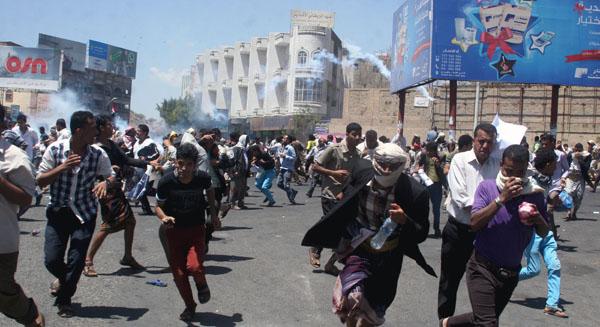You are here
How far does Iran’s backing of Yemen rebels go?
By AFP - Apr 09,2015 - Last updated at Apr 09,2015
DUBAI — Iran's backing of Shiite Houthi rebels came under fire from Washington on Thursday, but while there can be no doubt of Tehran's support for the movement, the full extent is unclear.
Secretary of State John Kerry said Thursday the United States would not "stand by" as the region is "destabilised" by Iran backing the Houthis.
Washington has already backed the Saudi-led air campaign launched by Riyadh after the Houthis took control of the capital Sanaa and then moved on the southern city of Aden, where President Abed Rabbo Mansour Hadi had taken refuge.
Sunni Muslim Saudi Arabia has repeatedly accused Iran — the main Shiite power — of backing the Houthis in a bid to instal a Tehran-friendly regime.
Kerry said Washington had traced flights from Iran in support of the Houthis and there have been several other signs of support in recent years.
Yemeni authorities have claimed several times to have intercepted ships carrying weapons allegedly from Iran to the Houthis.
Soon after the rebels overran Sanaa last September, eight Yemeni sailors who had been convicted of smuggling weapons to the Houthis were freed.
Two Iranians, said to belong to Iran's elite Revolutionary Guard, were released the same week after they were held in Sanaa on charges of training Shiite rebels.
Tehran's ideological influence on the Houthis was always clear, as they chanted the Iranian slogan "Death to America! Death to Israel!" at protest rallies and waved the flags of Lebanon's Hizbollah militia, which is openly backed by Iran.
Support 'largely overstated'?
As they consolidated their hold on Sanaa, the Houthis' links to Tehran became ever more clear.
The Houthi-run Saba news agency reported that Iran would provide Yemen with crude oil for a year and also build a 165-megawatt power plant.
A Houthi delegation was received in the Islamic republic and on March 1, an Iranian commercial flight landed in Sanaa — the first in many years and the fruit of an aviation accord with Tehran.
On Tuesday, Iranian state television reported that Tehran had sent a shipment of non-military aid to Yemen, the first since the coalition launched its operation.
Iranian officials have insisted they want peace in Yemen, but Riyadh's ambassador to the United States, Adel Al Jubeir, has said Tehran is fuelling the conflict.
"Iran provides financial support for the Houthis and helps them in building weapon factories and providing them with weapons," he said.
"We do not want the error of Hizbollah in Lebanon to be repeated with the Houthis in Yemen," he said.
A Gulf diplomatic official has accused Iran of providing "logistical and military support" to the Houthis and even of sending in forces to support the rebels.
"There are 5,000 Iranians, Hezbollah and Iraqi militia on the ground in Yemen," he said.
But some have raised doubts about the claims of wholehearted Iranian support.
Frederic Wehrey, an expert at the Carnegie Endowment for International Peace, said that "in all probability, the Saudis have largely overstated Iranian influence over the Houthis".
"The portrayal of what is happening in Yemen as an Iranian takeover is meant to rally US and Gulf/Arab support for the Saudi position," he wrote in a report.
Related Articles
DUBAI — Yemen's ex-president Ali Abdullah Saleh said in an interview broadcast Friday he had rejected "millions of dollars" Saudi Arabia off
President Recep Tayyip Erdogan on Monday insisted he was still planning to visit Iran next week, despite a war-of-words with the Islamic republic triggered by the Yemen crisis and his accusations that Tehran was seeking domination of the region.
Shiite militia in Yemen seized the airport in a key central city Sunday as deteriorating security prompted Washington to evacuate personnel and the UN Security Council to call an emergency session.

















